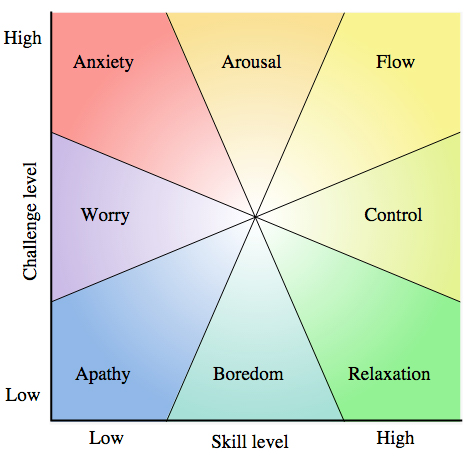This article first appeared on the Web log for the American Association of School Librarians. It is reprinted here by the kind permission of the author, Diane Main, director of learning, innovation and design at Harker.
When I work on family history research, whether it’s for my own tree or a friend’s, I often find I lose track of time, get totally “in the zone,” and sometimes even forget to eat and sleep enough. That combination of little successes and new challenges that pushes me to the edge of my abilities is something that is referred to as “flow.” If you spend a lot of time with kids, you will have seen it when they are playing video games and can’t seem to put them down. For others, it’s reading books or engaging in some hands-on hobby. Flow is the apex of engagement and motivation.
Mihály Csíkszentmihályi pioneered the research into this phenomenon. He was looking into happiness, creativity and motivation, and developed what we now refer to as flow. Flow is doing what you love and what you’re good at, but still being challenged by the activity. We see this in education as well, but sadly we perhaps don’t see it often enough. It is generally thought that the integration of technology into learning environments tends to instantly increase learner motivation and engagement. While this may be true for a short time, unless the use of technology tools builds skills while also presenting appropriate challenges, it loses its motivational value.
As seen in this image from Wikipedia, flow exists at the intersection of high skill level and high challenge level. The emotions that exist in the other regions of the chart are not really what we’re aiming for in learning situations. This can be where games can swoop in to the rescue, as long as their introduction is meaningful and their use well thought-out. Sometimes, it’s great to just have gaming breaks, using games of all kinds, to “reset” the brain and ignite motivation. A quick round of charades or five minutes with Zombie Drop can be a great way to get kids to transition from one activity in class to another.
But there are some games that are becoming the platform for the learning itself, and that are being used for entire class periods over days or even weeks. One such example is MinecraftEDU. Most parents and educators have at least heard of Minecraft. The educational version MinecraftEDU is only available to schools, and it is quickly becoming THE destination for teachers and students who want to maximize learner creativity and engagement in subjects from history and literature to math and science. I teach a computer science course that functions as a survey of the field of computer science without focusing exclusively on programming. We use MinecraftEDU to explore concepts in computer science (such as subroutines, abstraction, conditional statements, loops and algorithms), to engage in the design thinking process by building homes for one another, and to explore introductory level programming with in-game robots called turtles. Instead of learning about our content, my students get the chance to be immersed in a virtual world they can manipulate and learn from.
An unexpected benefit, the first few times I used MinecraftEDU with my high school students, was the community building that seemed to occur instantly when we began to use the game in class. Students who had formerly kept to themselves and not spoken much in class suddenly appeared comfortable with me and the rest of their peers when they started interacting within the game environment. And since most of them had never played Minecraft before, they had a lot to learn, which they did by figuring things out and then teaching each other. Before long, my hesitant high schoolers were losing hours in the game world, building and communicating in ways none of us thought possible. I had stumbled upon a way to bring them to a place of flow. And now I’m hooked too.
